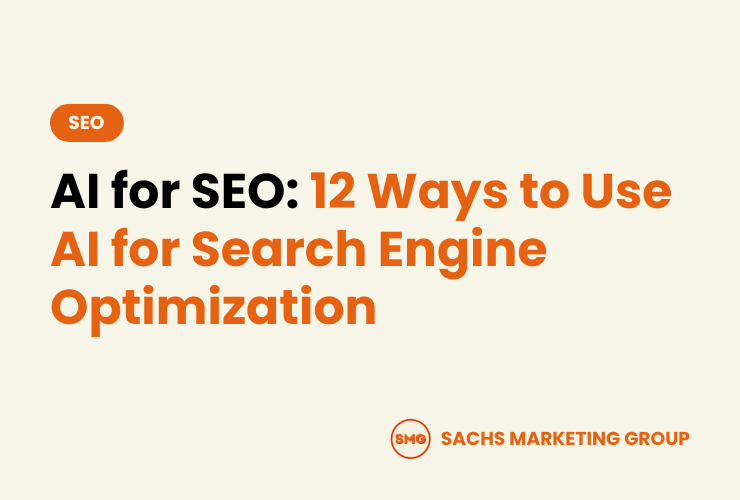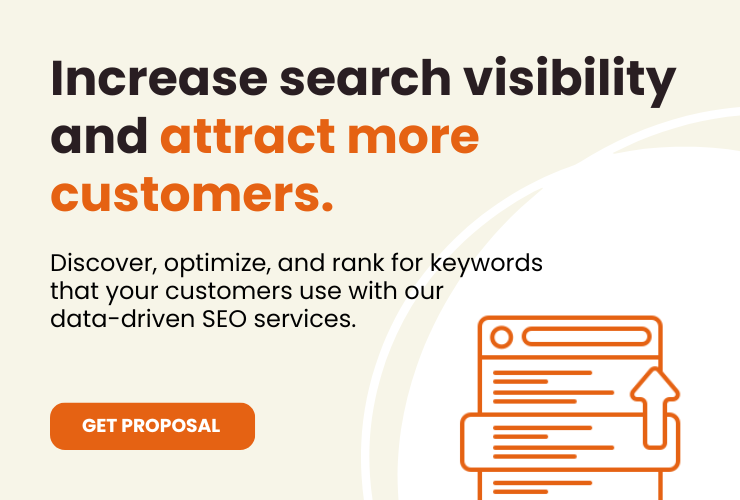There are many ways to use AI for SEO, but the most helpful involve reducing the time required to perform specific tasks relating to research, data analysis, and content development. By streamlining these tasks, SEOs can focus on creative and competitive strategies. AI can supercharge your SEO efforts, but it’s important to remember it’s just another tool to assist you, not replace human expertise.
As search engines have evolved over the years, becoming more advanced and complex, so has the search engine optimization (SEO) process.
In the early days, ranking prominently in search engines was as simple as identifying and placing keywords on the page. Today, SEO is more challenging and involves multiple layers of optimization, from on-page and off-page optimization to local and technical optimization.
More importantly, due to search engines’ demands and the competitive nature of the modern web, it takes longer than ever to complete the comprehensive research required for a successful SEO strategy.
Fortunately, SEOs are masters of optimization—whether it’s optimizing a website or optimizing their process. This brings us to AI, a powerful tool that SEOs use to assist them throughout all stages of the optimization process.
In this article, we explore some of the most popular AI tools and share how to use AI for SEO to streamline the optimization process.
Key takeaways:
- AI Enhances Efficiency and Insight in SEO: AI tools can significantly improve your SEO efforts by automating tasks, conducting in-depth research, and providing data-driven insights. This allows you to optimize your content, stay ahead of industry trends, and outmaneuver competitors with precision and efficiency.
- Comprehensive Content and Optimization: AI can help generate detailed content outlines, perform content audits, optimize meta tags and image alt text, and ensure your website is well-structured, relevant, and search engine-friendly. This holistic approach improves your site’s visibility and user engagement.
- Human Expertise is Irreplaceable: While AI offers powerful capabilities, it cannot replace the creativity, strategic thinking, and empathy that human SEO professionals bring. Use AI as an assistant to handle technical tasks but rely on human skills for crafting engaging content, making strategic decisions, and adapting to changes in the digital landscape.
Overview
What is AI for SEO?
AI, or artificial intelligence, is transforming the world of SEO. It’s not replacing SEO best practices or the need for human experts, but rather helping professional SEOs streamline the SEO process.
SEOs use many tools, but AI is the newest and has proven to be a super tool due to its seemingly unlimited capabilities. Professionals use AI for SEO tasks like research, content creation, data analysis, and schema markup generation.
While AI can help automate specific tasks and create content, SEOs are cautious about relying on it without oversight because it is known to make mistakes (hallucinations). That said, AI does help reduce the time it takes a professional SEO to complete tasks.
AI Tools for SEO
Here’s a quick overview of some of the most popular AI tools used for SEO. This list isn’t exhaustive, as there’s no shortage of tools implementing AI features, but rather a focused list based on what we’ve found helpful.
- Surfer: Analyzes top-ranking content for your target keywords and provides data-driven suggestions for optimizing your content. This can include optimizing title tags, headings, content length, word count, images, and internal linking for better ranking potential.
- Ahrefs: While Ahrefs isn’t solely AI-powered, it offers features that leverage AI for tasks like content analysis and competitor research. It can identify content gaps on your competitor’s websites and suggest targeted topics based on search volume and backlink profile.
- Semrush: Semrush offers a suite of AI-powered SEO tools. It can analyze your website content for readability and originality, identify technical SEO issues, and suggest content improvements based on competitor analysis.
- Outranking: Outranking uses AI to help create SEO-friendly content. It can generate content based on keywords, analyze competitor content, and suggest improvements to your existing content for better search engine optimization.
- AlliAI: AlliAI crawls your website and identifies areas for improvement in on-page SEO. It can analyze content for keyword usage, readability, and technical SEO factors, providing suggestions to optimize your website for search engines.
- Jasper: Jasper can help brainstorm content ideas, generate outlines, and even write sections of your content based on your target keywords and desired tone of voice. This can save time on content creation and ensure your content includes relevant keywords naturally. Jasper was around before ChatGPT exploded in popularity and helped SEOs generate content at scale.
- ChatGPT: While not explicitly designed for SEO, ChatGPT can be used creatively to brainstorm content ideas, generate product descriptions, or write meta descriptions. However, ensure the information is accurate and relevant to your target audience.
- Gemini: Similar to ChatGPT, Gemini’s capabilities can be used creatively for SEO. It can help brainstorm content ideas, generate outlines, or write specific content sections. However, always fact-check and refine the generated content for SEO optimization.
How to Use AI for SEO
Leveraging AI for SEO can transform your digital marketing strategy, making it more efficient and effective.
Harnessing the power of AI for SEO can significantly enhance your SEO process and strategy.
By leveraging its capabilities, you can reduce the time it takes to complete comprehensive research, outline ideas, analyze data, and generate specific types of content.
At Sachs Marketing Group, we use AI as an assistant for specific tasks but do not trust AI to produce the best results 100% of the time. In our experience, it’s best to use AI for assistance.
Here’s how to use AI for search engine optimization:
1. Industry Research
AI tools are game-changers when it comes to industry research. They can sift through enormous amounts of data to pinpoint trends and shifts in consumer behavior.
Imagine having a virtual assistant that continuously scans the internet, collecting data on what’s hot and not in your industry.
This real-time analysis can reveal emerging trends before they become mainstream, allowing you to adjust your SEO strategy accordingly. You can identify new opportunities for content creation, understand seasonal changes in your market, and tailor your marketing efforts to meet the evolving needs of your audience.
By leveraging AI for industry research, you gain a strategic edge, ensuring your SEO efforts always align with the latest market dynamics.
2. Competitor Research
Understanding your competitors is crucial for any successful SEO strategy, and AI makes this task much more manageable.
AI tools can quickly analyze your competitors’ websites, offering insights into their content, keywords, backlinks, and overall performance. This analysis reveals what they’re doing right and where they fall short.
With this information, you can craft a strategy to outperform them. For example, if a competitor’s content ranks high, AI can help you understand why and suggest ways to create even better content. You can capitalize on these areas by identifying gaps in their strategy to gain a competitive advantage.
AI-driven competitor research ensures you’re not just keeping up with your rivals but staying ahead of them.
Related: AI in Digital Marketing: A Guide for Small Business Owners
3. Keyword Research
Keywords are the backbone of SEO, and AI-powered tools take keyword research to the next level.
These tools analyze search data to uncover high-performing keywords relevant to your business. They can predict keyword trends, helping you stay ahead of the curve. Additionally, AI can analyze search intent, ensuring you understand what users are really looking for when they use certain keywords.
This allows you to target the right keywords to attract your audience effectively. Instead of manually sifting through data, AI does the heavy lifting, providing you with optimized keywords that can drive more traffic to your site.
This targeted approach increases the chances of converting visitors into customers.
Related: How to Select SEO Keywords for Your Website
4. Topical Maps & Content Clusters
Organizing your content effectively is essential for SEO success, and AI can help by creating topical maps and content clusters.
A topical map outlines the main topics your website should cover, while content clusters group related content around these topics.
This structure makes your site easier to navigate and enhances its relevance and authority in the eyes of search engines. AI analyzes your existing content and identifies gaps, suggesting new topics to cover. It helps you interlink related articles, creating a web of content that boosts your SEO.
Using AI to develop topical maps and content clusters ensures your website is well-organized, comprehensive, and authoritative, improving your search engine rankings.
5. Content Audits
Regular content audits are essential for maintaining a high-performing website, and AI tools can make this process much more efficient.
By conducting comprehensive audits, AI can quickly identify gaps in your content, highlighting areas where information is outdated or missing. It can also spot opportunities for optimization, such as enhancing keyword usage or improving readability.
This thorough analysis ensures that your content stays relevant and engaging for your audience. Furthermore, AI can assess the performance of your content, helping you understand what works and what doesn’t.
With these insights, you can update and refine your content strategy, ensuring that your website remains competitive and continues to attract and retain visitors.
6. Content Outlines
Creating well-structured content is crucial for SEO, and AI can help you achieve this by generating detailed content outlines.
AI tools can suggest the best structure for your articles, blog posts, or other content types based on thorough keyword research and competitor analysis.
These outlines ensure that your content is comprehensive and covers all relevant points, enhancing its value to readers. They also help you maintain a consistent flow and logical progression, making your content more accessible.
By using AI to create content outlines, you can save time on planning and focus more on writing. This results in higher-quality, SEO-optimized content that effectively addresses your audience’s needs and boosts your search engine rankings.
7. Content Generation
With advanced natural language processing capabilities, AI tools can help generate content quickly and efficiently.
These tools can produce well-written blog posts, articles, and other types of content that are tailored to specific keywords and search intent.
AI for content generation can streamline the process, producing high-quality, SEO-optimized content quickly. However, it’s crucial to understand that AI-generated content isn’t always accurate and requires oversight.
SEO professionals must review and refine this content to ensure it’s relevant, not misleading, and aligns with the brand’s voice. You can train AI tools, like ChatGPT, but it still requires oversight.
Relying on AI 100% is risky, especially in YMYL (Your Money or Your Life) industries like health and legal sectors, where accuracy and trustworthiness are paramount. AI can inadvertently produce errors or misinformation, potentially damaging your website’s credibility and SEO performance.
This is why Sachs Marketing Group still works with professional writers to produce content for its clients.
If you plan on using AI to generate content, proceed cautiously!
Related: How to Write Content for A Website [13 Actionable Tips]
8. Internal Link Optimization
Internal linking is a vital aspect of SEO, and AI can optimize this process by analyzing your site’s structure and suggesting linking opportunities.
Effective internal links help distribute link equity across your site, enhancing the SEO value of your pages. They also improve user navigation by connecting related content, making it easier for visitors to find information.
AI tools can automatically identify where internal links are needed and where existing links can be improved. This ensures that your internal linking strategy is both comprehensive and strategic.
By optimizing your internal links, you enhance the overall user experience and boost your site’s search engine rankings, making it more accessible and valuable to your audience.
9. Image Alt Text Optimization
Images are crucial to any website, but without proper alt text, search engines can overlook them.
AI can help automatically generate descriptive and SEO-friendly alt text for your images. This not only improves your site’s accessibility for visually impaired users but also enhances its search engine visibility. AI tools can analyze the content of your images and create relevant descriptions incorporating targeted keywords. This means your images are more likely to appear in image search results, driving additional traffic to your site.
Using AI for image alt text optimization ensures that every aspect of your content, including visuals, contributes to your overall SEO strategy.
10. Meta Tag Optimization
Meta tags, including titles and descriptions, play a vital role in SEO by influencing how your content appears in search engine results.
AI tools can optimize these meta tags by ensuring they are compelling and keyword-rich.
AI analyzes the content of your pages and generates meta titles and descriptions that are relevant and designed to attract clicks. Well-optimized meta tags can significantly enhance your click-through rates, driving more traffic to your site.
By leveraging AI for meta-tag optimization, you can ensure that your content stands out in search engine results, providing a clear and attractive summary that encourages users to visit your site.
11. Schema Markup Generation
Schema markup is a type of structured data that helps search engines better understand the content of your website.
AI can simplify the creation of schema markup by automatically generating the necessary code.
This markup can enhance your site’s visibility with rich snippets, such as star ratings, event details, and other information that can appear directly in search results. These rich snippets can make your listings more attractive and informative, leading to higher click-through rates.
Using AI to generate schema markup ensures your site is well-represented in search engine results, providing detailed information that can improve user engagement and SEO performance.
12. Data Analysis
AI can sift through large datasets to uncover valuable trends and insights that inform your SEO strategy.
AI can help reveal a comprehensive view of your site’s performance, from analyzing keyword performance to understanding user behavior. These insights can help you make data-driven decisions, such as which keywords to target, what content to create, and how to improve user experience.
By leveraging AI for data analysis, you can stay ahead of trends, adapt quickly to changes, and continuously optimize your SEO efforts to achieve better results.
Professional SEO Services Enhanced with AI
Are you ready to take your SEO to the next level? At Sachs Marketing Group, we combine human expertise with AI insights to supercharge your SEO strategy.
Our SEO services, enhanced by AI for SEO, ensure you stay ahead of the competition and achieve lasting results.
Contact us today to discover how our SEO services can help improve your rankings, traffic, and leads.
Conclusion
Incorporating AI for SEO into your strategy can improve your SEO process, resulting in a more efficient process.
How you use AI for SEO is up to you, but we recommend using it as a tool rather than a turnkey solution. By balancing AI technology with human ingenuity, you can stay ahead in the competitive digital landscape and effectively achieve your business goals.
Contact us today to get the conversation started!













